
Today at Union Station, a coalition of transit, labor and environmental advocates held a rally to "Fix and Fund Public Transit," demanding that Illinois lawmakers reconvene and provide full funding for public transportation. Speakers called for a special summer session to pass a bill that would rescue Chicagoland transit from some 40 percent service cuts and 3,000 layoffs.
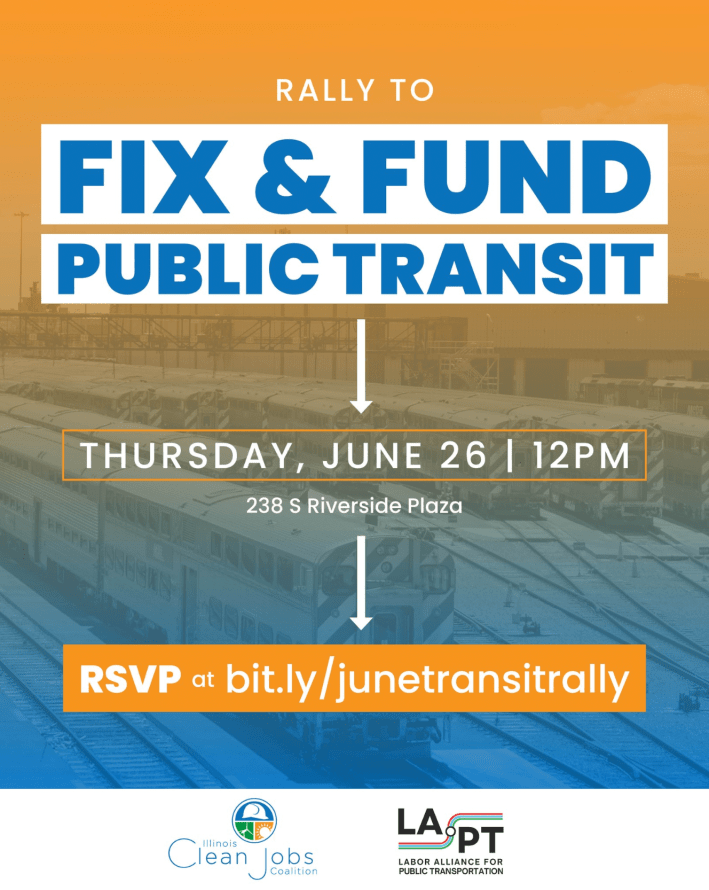
The CTA, Metra and Pace face a combined $771M budget gap next year, when federal pandemic funding is expected to run out. On May 31, a bill that would have secured $1.5B for transit, rescuing the systems from the impending fiscal cliff while providing for system improvements and governance reforms, passed the State Senate around midnight. But state representatives chose not to call the bill for a House vote before the close of the spring legislative session that night, citing a lack of support. The next session convenes in October, which may be too late to avoid austerity measures, since the agencies are planning their 2026 budgets now.
On this hot, sunny afternoon, a crowd of over 100 gathered at Riverside Plaza, near the Jackson Boulevard entrance to the railroad station. Members of ATU Local 308, the rail workers union, showed up in large numbers, easily identifiable in their bright yellow shirts. Members of the Active Transportation Alliance, Better Streets Chicago and the People’s Lobby were in attendance. Signs reading "Transit is Essential" and "Public Transit is a Climate Solution" were distributed by the Illinois Clean Jobs Coalition.
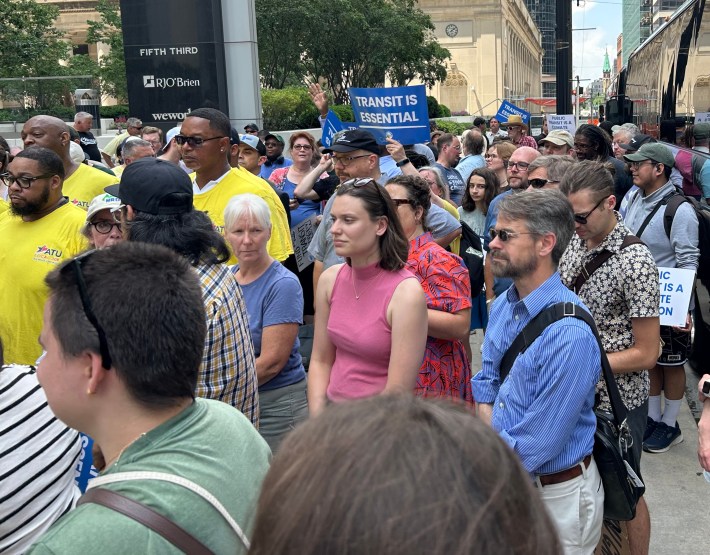
The event began a little late because station security personnel asked the organizers to move from Union Station property to the public sidewalk. "You do realize this is a rally to save transit?" one attendee asked a staffer incredulously. She nodded politely and directed the crowd to gather on Adams Street in the shade of the Fifth Third Bank Center.
The first speaker was State Sen. Ram Villivalam (D-Chicago), a leading sponsor of the transit funding and reform bill, HB3438. Villivalam celebrated the passage of the legislation in the Senate and acknowledged the Chicago Metropolitan Planning Agency for its role in crafting the legislation.
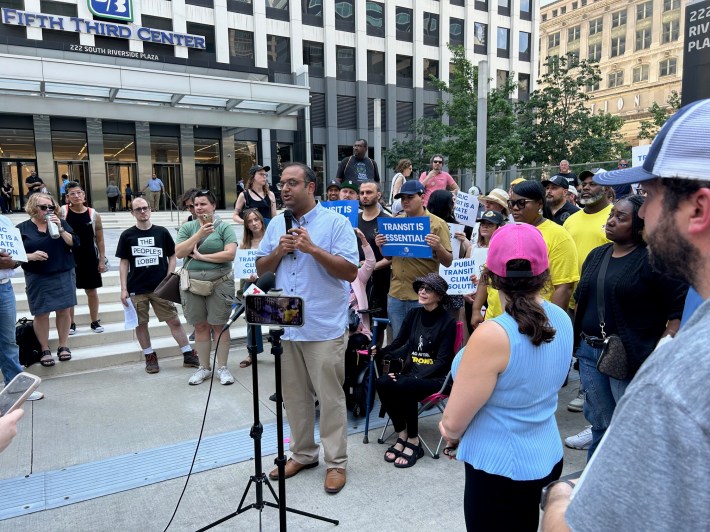
He then introduced State Sen. Graciela Guzman (D-Chicago), a co-sponsor of the bill. "I’ve gotten thousands of letters saying, 'I can’t get to work without transit– will I have a job if we don’t fund transit?'" she said. "We know as an assembly, we have to act on transit and we have to act sooner than October."
"I’m here to announce this is a Hot Transit Summer!" she quipped. As if on cue, a fire truck passed, its siren drowning out the cheers of the crowd.

Union leaders spoke next, including Orlando Rojas of Local 653. Rojas asked the crowd to imagine the chaos that would ensue if large portions of the highway system was shut down due to lack of funding. "If people can’t take mass transit, they’ll need to take the roadways," he noted. "It will have the same effect as shutting down lanes we currently have. Those who can’t afford a car or are unable to drive will be forced to take ride-shares or taxis. It would be disastrous for people who use mass transit. it would be disastrous for the area’s economy. It would be disastrous for the environment. It would be disastrous for the quality of life for everyone living in the region, if not the state."
Rojas spoke about the impact 3,000 layoffs would have on the lives of transit workers. "Pink slips for those cuts begin to go out in September," he said. "These are the same workers considered essential during the COVID pandemic, who provided transportation to other essential workers. We are calling on our elected officials to do the right thing."
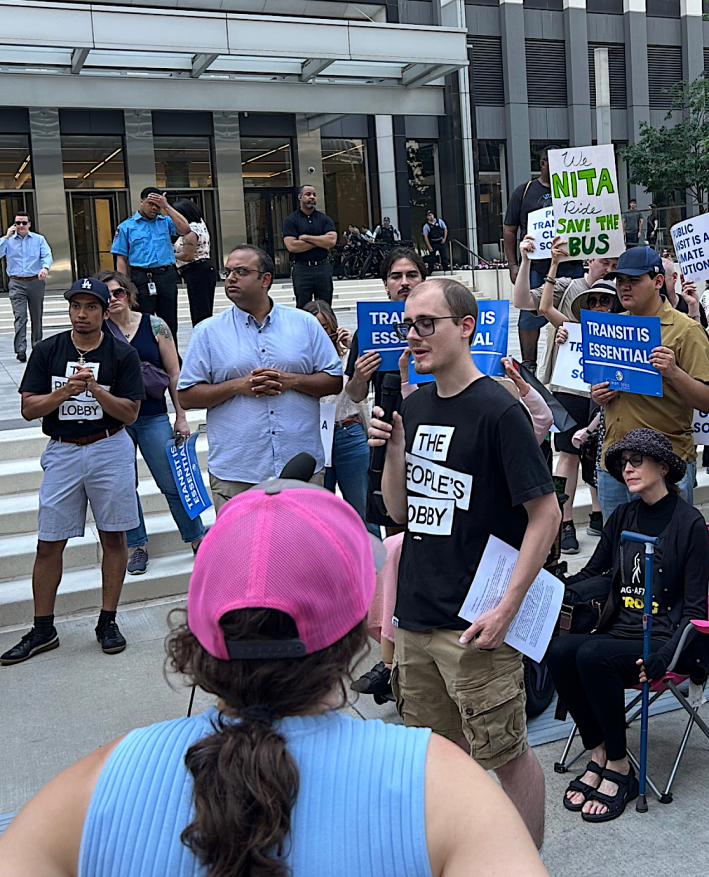
The next two speakers gave personal testimonials about their reliance on public transportation. Evan from Wheaton told the story how he took the train to the Oglivie Transportation Center to receive treatment for a cancer diagnosis at Northwestern Memorial Hospital. However, he found the bus system so daunting, he would walk the forty minutes to and from the station to the hospital, "up to five days a week, in the cold of winter. All this undergoing chemotherapy," he said. "Chicagoland has great transit bones but there’s so much we need to improve on."
Ann-Marie, a flight attendant, said she moved to Chicago because of its transit system. She relies on the Orange Line to commute to Midway Airport at all hours and on weekends and holidays. Drastic service cuts would make it very difficult for her to get to work.
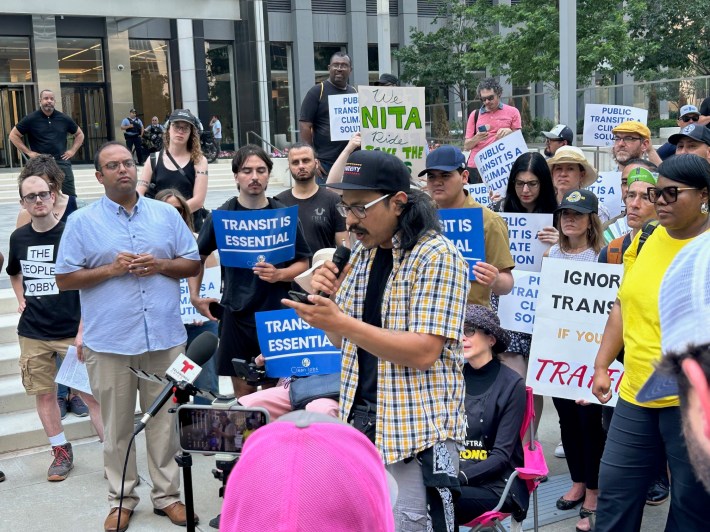
The last to speak was Equiticity Director of Advocacy Jose Almanza, who noted that transportation equity is a racial justice issue. "We know what’s possible if we win, we know what we lose if we don’t," he said. "This isn’t just about buses and trains. It’s about dignity and respect. If lawmakers return to Springfield and do the right thing and pass the $1.5 billion in funding for transit, we can build something worthy of our communities. A system where buses show up, where Metra and CTA connect. Let’s build a system we deserve. One that shows up like we do."
Indeed, today's turnout despite the blazing weather was proof that Chicagoland residents care deeply about the transit funding crisis. How lawmakers respond to this challenge will surely be a major factor the next time they're up for reelection.

Did you appreciate this post? Streetsblog Chicago is currently fundraising to help cover our 2025-26 budget. If you appreciate our reporting and advocacy on local sustainable transportation issues, please consider making a tax-deductible donation here. Thank you!






